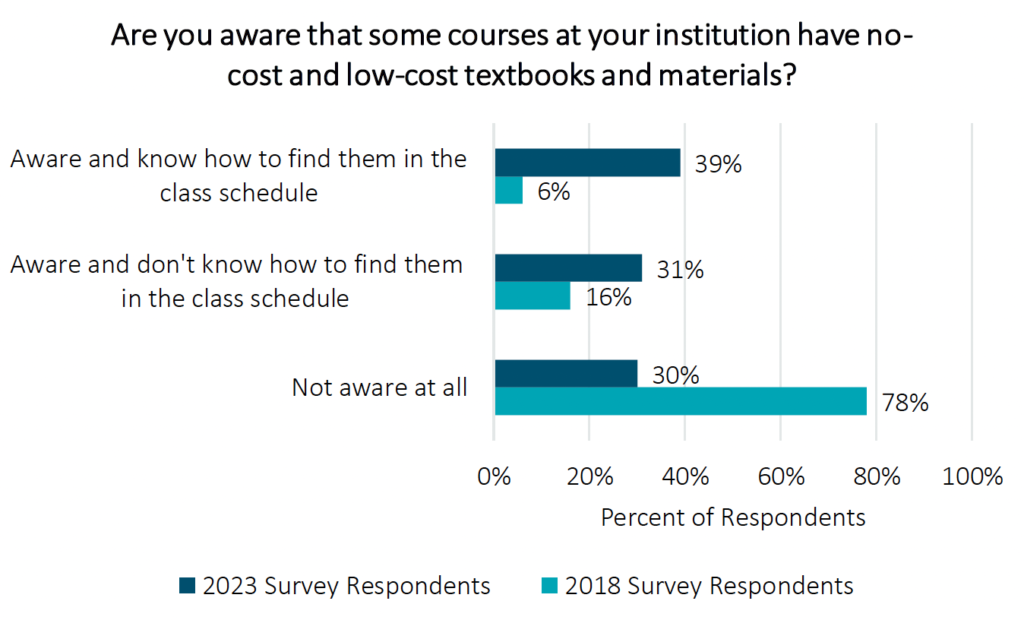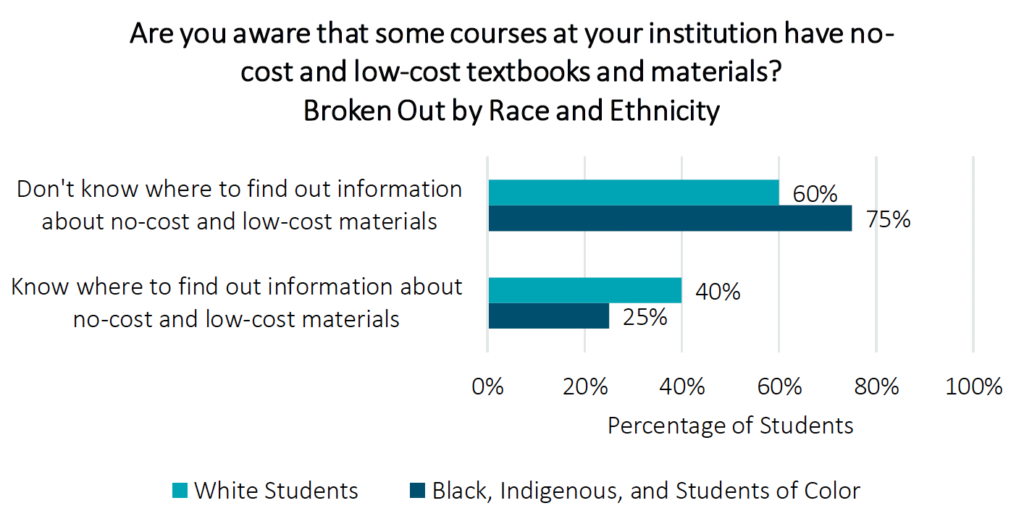Oregon’s Higher Education Coordinating Commission requested a research report evaluating the effectiveness of textbook affordability policy implementation at Oregon’s 24 public community colleges and universities. The report was completed in June 2023 by Ramona Bias, Adriana Flowers, Esmeralda Flores, Tram Anh Hoang, and Katie Inger as their Master of Public Administration Capstone at the University of Oregon School of Planning, Public Policy and Management. The team’s findings are summarized below.
Policy landscape
Oregon has three textbook affordability policies:
- HB 2871 (2015) requires Oregon’s public universities and community colleges to prominently label courses that use no-cost or low-cost course materials in the course schedule.
- HB 2213 (2019) requires each public institution to establish a textbook affordability plan.
- HB 2919 (2021) requires the on-time adoption and displaying of course materials for at least 75% of for-credit courses before registration opens.
Open Oregon Educational Resources is a statewide resource to help institutions implement textbook affordability policies, for example by providing student savings data, encouraging institutional leaders to prioritize this work, or facilitating information-sharing between institutions to find efficiencies. Contact us for assistance.
Student perspective
The capstone group’s student survey findings show that Oregon’s institutions can improve how we communicate with students about the cost of course materials (student survey analysis begins on page 17 of the full report).
Survey results show that students want to know all their expenses for a term as soon as possible, preferably before they register for courses. Students want information about no-cost and low-cost options prominently displayed everywhere that course information is shared (e.g., online schedule, student registration portal, bookstore, learning management system, etc.). The survey also found that students have different understandings of “low-cost” than their institutions. One respondent wrote:
I wish they were more transparent about the cost of textbooks prior to registration. Oftentimes, I find myself surprised when I register for a class and discover that I am going to be paying a lot of money for a textbook on top of the other course materials and an online fee.
The current report is a follow-up to a previous evaluation conducted in 2018 (more information: Evaluating Oregon’s Open Educational Resources Designation Requirement). The 2018 student survey found that very few students were aware of their college or university’s efforts to designate no-cost and low-cost courses in the schedule. The current report finds that we are making gains in student awareness compared to 2018. However, when the data is broken out by race and ethnicity, the gains are uneven.

Chart details: In answer to the question “Are you aware that some courses at your institution have no-cost and low-cost textbooks and materials?” 39% in 2023 and 6% in 2018 were aware and know how to find them in the class schedule; 31% in 2023 and 16% in 2018 were aware and dont know how to find them in the class schedule; and 30% in 2023 and 78% in 2018 were not aware at all.

Chart details: When 2023 answers to the question “Are you aware that some courses at your institution have no-cost and low-cost textbooks and materials?” are broken out by race and ethnicity, 60% of white students and 75% of Black, Indigenous, and Students of Color don’t know where to find out information about no-cost and low-cost materials; and 40% of white students and 25% of Black, Indigenous, and Students of Color know where to find out information about no-cost and low-cost materials.
Highlights for institutional stakeholders
The report has recommendations that institutions can follow to improve their textbook affordability policy implementation (institution-level recommendations begin on page 53 of the full report).
Regarding the schedule designation, pages 7-11 of the full report provide visual examples of user-friendly implementations that institutions can adopt or adapt. The report recommends:
- Clearly define “no-cost” and “low-cost”
- Use a clear indicator
- Display designations wherever possible
- Allow filter by cost
- Provide detailed book and material information
Regarding effective textbook affordability plans, the report recommends:
- Plan must not sit on a shelf
- Engage students in the creation of textbook affordability goals
- Collect data to measure progress
- Administration must share ownership of the plan
Overall, Oregon’s community colleges and universities can be proud of the progress made since 2015. Significant work has gone into implementing these policies, and the data reflects this. The capstone group’s recommendations offer guidance for improving on the foundation already laid.
